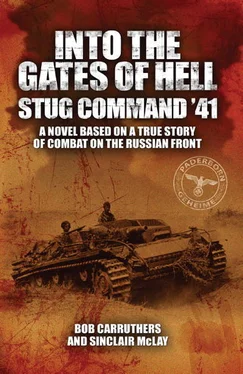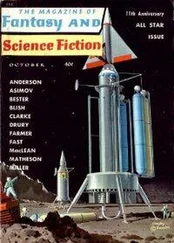“Choose your targets carefully. Be alert for ground recognition markers. There’s some anti-aircraft fire, so be vigilant,” Rossheim told his squadron and the bombs of the Ju-87 formation were soon raining down on the identifiable targets far below in the fortress. It was almost impossible to observe the details of the hits, everything being instantly wreathed in dense clouds of smoke.
As Rossheim had warned, there was some desultory anti-aircraft fire and, needless to say, it was one of those rounds which registered a hit on the oxygen bottle in Rossheim’s Stuka. The oxygen bottle promptly exploded. Fortunately, the explosion left both crewmen uninjured, but it had a catastrophic effect on the aircraft, which seemed close to disintegration. Simply everything on that machine now wobbled and shook, but somehow it remained in the air, despite the fact that everything seemed to have been torn apart.
“We have some problems with the aircraft,” Rossheim radioed◦— a masterful understatement.
He glanced back and saw to his dismay that the tail unit was practically severed, hanging by the operating rods of the controls alone. Accordingly, he slowed down to the slowest possible airspeed and made a long turn for home. He was praying that the machine would stay in the air. Somehow, it held together. He knew from his long experience which stretched all the way back to Spain that the Ju-87 could take an enormous amount of punishment, but this particular machine couldn’t go on forever. It dissolved into its component parts as it landed on the temporary field near Terespol, but by a miracle neither Rossheim nor his gunner were injured.
As he disentangled himself from the wreckage and slowly began the long walk back across the grass Rossheim was staggered to witness the welcome sight of Leutnant Spiegel, who simultaneously arrived by horse-drawn cart. Judging from the bloodied bandage around his head, Spiegel seemed to have been badly wounded. Rossheim was delighted to see him back, but from the look of him it appeared that he had endured a more than adventurous journey.
“Welcome back to the squadron,” said Rossheim, greeting the wounded man as he stepped down from the cart which deposited the airman on home turf. “We thought we’d lost you… Are you badly hurt?”
“It’s nothing serious… just a gashed forehead.”
“That’s good news. Was it a bullet?” enquired Rossheim.
“Fortunately, no, it was not. It actually happened to me later in the day. When the Rata got me I had to make an emergency landing with numerous hits in the engine. It’s so embarrassing for me. That fight with the Soviet fighter must have been the very first engagement of the campaign and I went straight down.“
“Well, it’s fame of a sort. The good thing is that you’re back in one piece. Did your gunner make it?”
“Sadly, no, Oberleutnant, he did not. He was too badly wounded and, unfortunately, he died soon after our landing. I had no idea where he had come down and I didn’t know whether the territory had already been occupied by German troops, or whether it was still in Russian hands. Fortunately, the infantry battalion you spotted was on the march nearby. When they got to me I expressed rather… err… forcefully how important our air support mission was and I had the barefaced cheek to demand a car at once!”
“Looks like it failed,” said Rossheim with a nod to the departing cart.
“It didn’t actually, Herr Oberleutnant. To my immense surprise, a car and driver were immediately placed at my disposal and then off we went, heading slowly down the side road to Brest-Litovsk. The chauffeur was terrified and was keen to drive me to the German jumping off lines, so we slowly bowled along, aiming for the airfield here at Terespol.”
“You must have been glad of an uneventful journey. No contact with any lurking Soviet remnants, I take it?”
“Well, it wasn’t entirely uneventful. We did, in fact, have a brush with Ivan. A Soviet ammunition truck came hurtling along behind us and ran us off the road, into a tree. That’s where I think I got my injuries. I must have blacked out because the next thing I knew I was in the cart. Fortunately, it feels like nothing too serious and it was then no great distance here. So here I am.”
* * * * *
Fierce fighting continued in the fortress throughout that fateful morning. By noon on the 22nd of June the Germans had captured most of the surviving buildings in the hospital grounds. In a surge of bloodlust fuelled by their own losses, they killed the few remaining patients and all of the wounded officers and men. Under the cloud of smoke, savage fighting continued throughout the immense fortification. The defence that was mounted at the southern Cholmsker gates and on the outer earthworks was especially fierce.
All the while the surviving nurses did their best to treat the patients and wounded men who were now hidden in the casemates. Nurse Bettina Ostermann took a brief break and recorded the names and addresses of those who were there that day on her trade-union membership card. She sorrowfully recorded how she had been told the tale of how a nineteen-year-old nurse, Vera Khoretskaya, had died a heroine’s death while shielding a wounded soldier as the enemy infantry closed in.
By the end of the 22nd of June the Germans had made further gains and had managed to occupy the barracks between the Cholmsker and Terespol gates, but the spirit of the defenders was strong and the prospect of renewed struggle on the morrow remained.
* * * * *
As the battered StuG battalion rolled back into the assembly area Fritz Rubbal and his maintenance team went to work. Fresh ammunition was loaded aboard from the plentiful stocks and fuel cans were dragged to the thirsty vehicles. As he dismounted from the assault gun, von Schroif recognised the familiar figure of SS-Sturmbannführer Voss, who patiently awaited von Schroif’s report after each engagement, eager to understand the course of events. With him on this occasion however was General Schlieper, commander of the 45th Infantry Division. This required some formality and von Schroif sprang to attention.
“Hauptsturmführer von Schroif reporting, General. I regret to inform you of the loss of four vehicles and that another is severely damaged. I regret also to inform you, Sturmbannführer, that you were correct yesterday when you warned us about the reality of fighting Ivan. It is impossible to advance here. The infantry can’t make any headway because the highly-organised rifle and machine-gun fire from the deep gun emplacements and horseshoeshaped yard cut down anyone who approaches.”
“Well, we are both aware that the Sturmgeschütze should not advance without infantry support,” Voss replied. “From my experience, there may be only one solution◦— to force the Russians to capitulate through hunger and thirst.”
“We too have sustained very heavy casualties,” said General Schlieper, “and we are ready to use any means available to exhaust them… Our offers to them to surrender have been unsuccessful…”
“I fear that this is only the beginning,” said Voss. “These are not men who will simply give up the fight. I recall that, during the hard winter of 1916, a Russian regiment was surrounded in the woods by my command and had to be starved out. According to the prisoners, the Russians subsisted during those weeks on a few pieces of frozen bread, leaves and pine needles which they chewed, and some cigarettes. It had never occurred to anyone to throw in the sponge because of hunger, and the cold, which reached minus thirty, had not affected them. The kinship with nature, which the Russians have retained to a greater degree than the other peoples of Europe, contributes to the ability of the Russian soldier to adapt to terrain features, and to actually merge with them.”
Читать дальше












